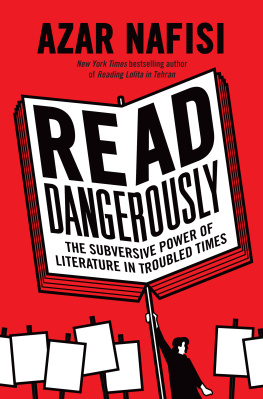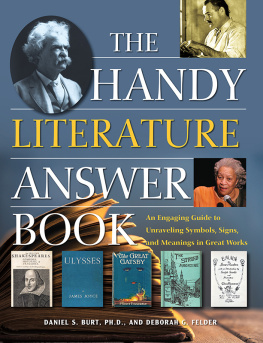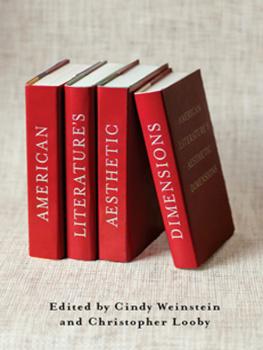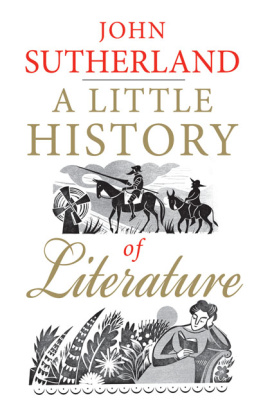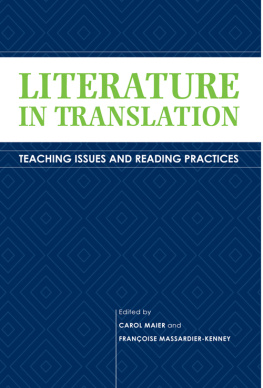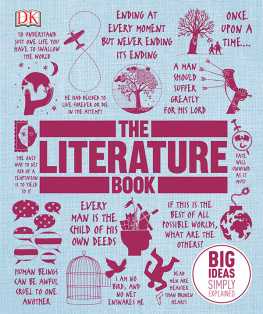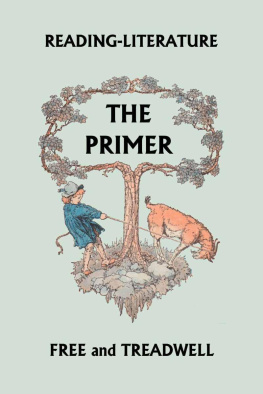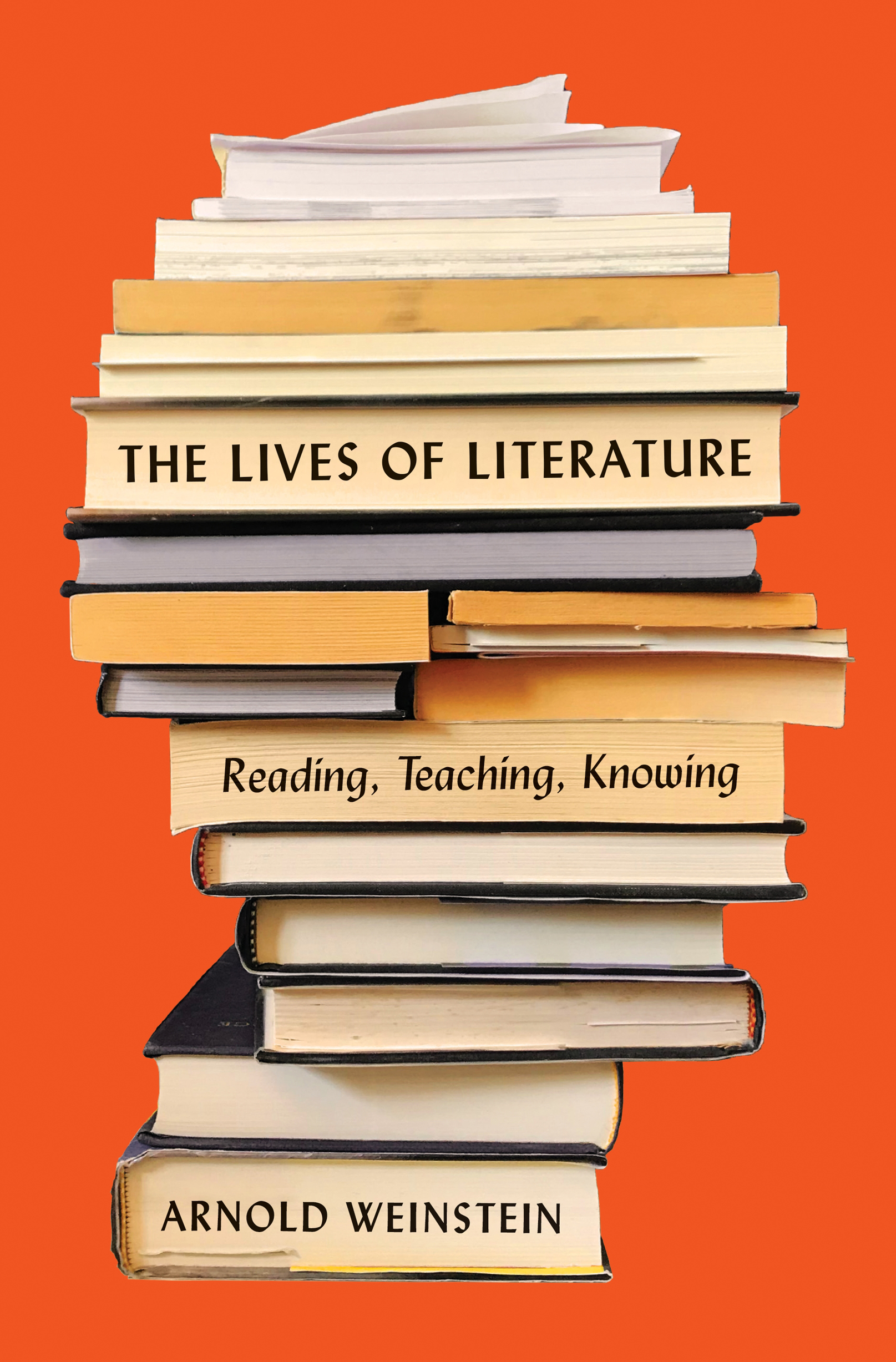THE LIVES OF LITERATURE
THE LIVES OF LITERATURE
Reading, Teaching, Knowing
ARNOLD WEINSTEIN
PRINCETON UNIVERSITY PRESS
PRINCETON AND OXFORD
Copyright 2021 by Princeton University Press
Princeton University Press is committed to the protection of copyright and the intellectual property our authors entrust to us. Copyright promotes the progress and integrity of knowledge. Thank you for supporting free speech and the global exchange of ideas by purchasing an authorized edition of this book. If you wish to reproduce or distribute any part of it in any form, please obtain permission.
Requests for permission to reproduce material from this work should be sent to
Published by Princeton University Press
41 William Street, Princeton, New Jersey 08540
6 Oxford Street, Woodstock, Oxfordshire OX20 1TR
press.princeton.edu
All Rights Reserved
Library of Congress Cataloging-in-Publication Data
Names: Weinstein, Arnold, author.
Title: The lives of literature : reading, teaching, knowing / Arnold Weinstein.
Description: Princeton : Princeton University Press, [2021] | Includes bibliographical references and index.
Identifiers: LCCN 2021026491 (print) | LCCN 2021026492 (ebook) | ISBN 9780691177304 (hardback ; acid-free paper) | ISBN 9780691232324 (ebook)
Subjects: LCSH: LiteraturePhilosophy. | Weinstein, ArnoldBooks and reading. | Characters and characteristics in literature. | Self in literature. | Best books. | BISAC: LITERARY CRITICISM / General | LITERARY CRITICISM / Semiotics & Theory | LCGFT: Literary criticism.
Classification: LCC PN45 .W357 2021 (print) | LCC PN45 (ebook) | DDC 801dc23
LC record available at https://lccn.loc.gov/2021026491
LC ebook record available at https://lccn.loc.gov/2021026492
Version 1.0
British Library Cataloging-in-Publication Data is available
Editorial: Anne Savarese, James Collier
Production Editorial: Terri OPrey
Text Design: Karl Spurzem
Jacket/Cover Design: Karl Spurzem
Production: Erin Suydam
Publicity: Alyssa Sanford, Carmen Jimenez
Copyeditor: Plaegian Alexander
CONTENTS
- vii
ACKNOWLEDGMENTS
It is a pleasure to acknowledge the help Ive received in writing this book. Some of it is obvious, some of it less so, since it is not easy to see the actual support structures that undergird anything one does.
I want, first of all, to recognize the assistance I have gotten over the past two years from my former student, Julian Fox. I enlisted him not only as assistant during the pandemic but also as junior colleague in this project: to aid me in tackling the work involved in permissions, production matters, and much else. His intelligence and generosity have been instrumental in the final stages of this work.
I want also to thank, formally, Anne Savarese at Princeton University Press for the sustained good will, critical acumen, and belief in me that I have felt during this entire project. Her diplomacy and clear-eyed sense of both my argument and my words have been invaluable to me. And I am in debt to the whole Princeton team, as I went through the copyediting and proofing of my manuscript. What might have been daunting turned out to be engaging.
My remaining acknowledgments are less obvious and direct, but arguably deeper still, longitudinal, and constituting much of the ground I stand on. Brown University has been the locus of my entire professional life, and I have benefitted immeasurably from its liberal culture and its student-centered curriculum, open to experiment and interdisciplinary forays. Some of this appears directly in my text. Much of it goes unsignaled, not easy to see. I can scarcely imagine what my life and work would have been elsewhere.
Finally, as in all my books, I salute the central influence of my wife, Ann Weinstein. Her wisdom, wit, and critical spirit have, sometimes like a whetstone, sharpened my mind; her native compass and sense of relative weights and measures have ever played a role in shaping my vision. She is my North Star.
Credits
Excerpt(s) from A Dream Play in Miss Julie and Other Plays by August Strindberg, trans. Michael Robinson (Oxford UP, 2009). Reproduced with permission of the Licensor through PLSclear.
Excerpt(s) from The Three Theban Plays by Sophocles, translated by Robert Fagles, translation copyright 1982, 1984 by Robert Fagles. Used by permission of Viking Books, an imprint of Penguin Publishing Group, a division of Penguin Random House LLC. All rights reserved.
Ithaca from Cavafy: Poems by C.P. Cavafy, translated by Daniel Mendelsohn, translation copyright 2009, 2012, 2014 by Daniel Mendelsohn. Used by permission of Everymans Library, an imprint of the Knopf Doubleday Publishing Group, a division of Penguin Random House LLC. All rights reserved. Reprinted by permission of HarperCollins Publishers Ltd 2014.
Excerpt(s) from The Poems of Emily Dickinson: Reading Edition, edited by Ralph W. Franklin, Cambridge, Mass.: The Belknap Press of Harvard University Press, Copyright 1998, 1999 by the President and Fellows of Harvard College. Copyright 1951, 1955 by the President and Fellows of Harvard College. Copyright renewed 1979, 1983 by the President and Fellows of Harvard College. Copyright 1914, 1918, 1919, 1924, 1929, 1930, 1932, 1935, 1937, 1942 by Martha Dickinson Bianchi. Copyright 1952, 1957, 1958, 1963, 1965 by Mary L. Hampson.
An Urban Convalescence from Collected Poems by James Merrill, copyright 2001 by the Literary Estate of James Merrill at Washington University. Used by permission of Alfred A. Knopf, an imprint of the Knopf Doubleday Publishing Group, a division of Penguin Random House LLC. All rights reserved.
INTRODUCTION
The Lives oLiterature: Reading, Teaching, Knowing
We go to literature because it houses human lives. The books one most remembers deliver their quarry so wonderfully that those (fictional) lives actually exist in peoples minds alongside the real people one knows. Oedipus, Hamlet, Don Quixote, Faust, Heathcliff, Jane Eyre, David Copperfield, Ahab, Emma Bovary, the brothers Karamazov, Huckleberry Finn, Gregor Samsa, Marcel, Leopold Bloom, Mrs. Dalloway, Gatsby, Quentin Compson, the Invisible Man, Yossarian, Celie, Setheamong many othersoccupy a good bit of human real estate, and some have claimed that we may know them better, more fully, than we know the actual people we know.
Further: one actually sees the arc of those fictional lives: Oedipuss transition from proud King back to cast-out infant and closing as blind exile; Lears trajectory from estate magnate to madman on a heath; Jane Eyres arc from unloved and abused child to monied, married woman; Gregor Samsas trip from bug-hood to garbage. This, we say, is the work of plot. But consider the true magic here: how all these transformations (which can take weeks, months, years, even a lifetime to happen, which therefore escape our vision, our knowing) are compressed, contained, or delivered in the scope of a few hundred pages, requiring mere hours to access, to process. We enter the bookstore, see all the books arrayed there, and think: so many books, so little time; but the truth goes other way: books do not take time, they give time. They enable us to see the dimensions of life, a gift and a vision that are unavailable to us as we live day to day. Reading lives, in every sense: literature brings us, virtually, into the experiences and fates of its characters, but it is the act of reading that turns long-ago and faraway printed words into life, our life.


